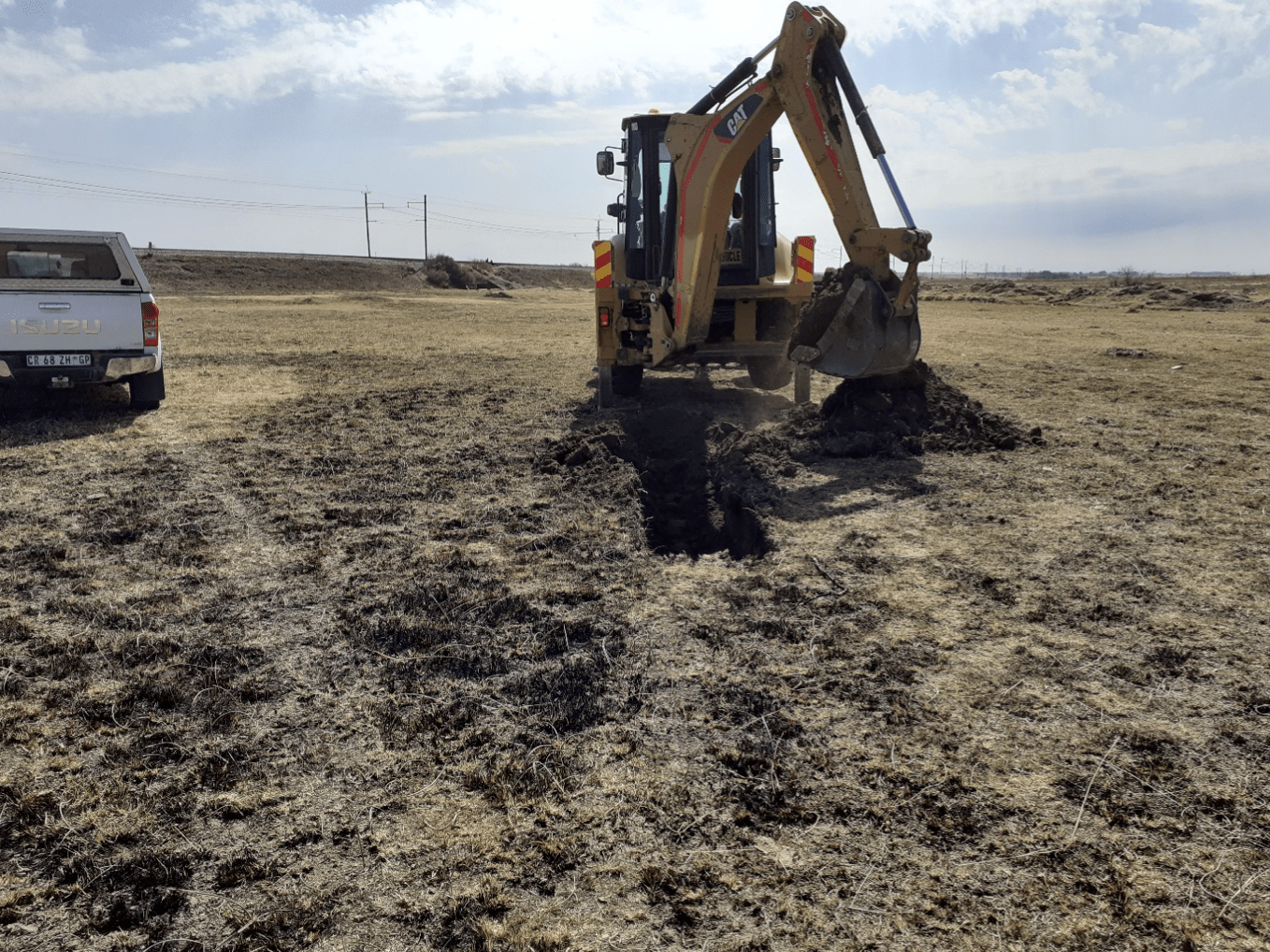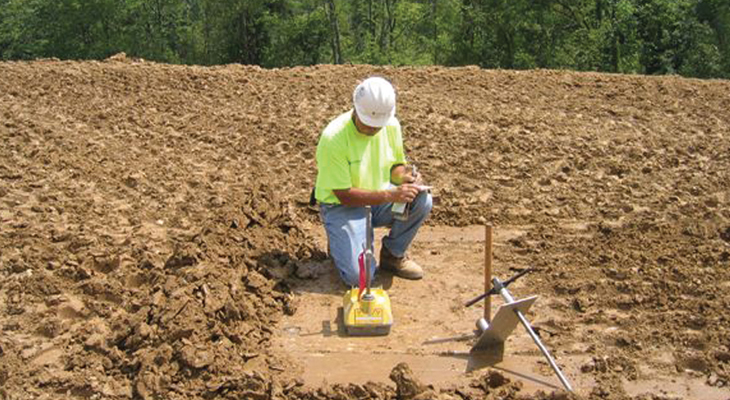Why All About Geotechnical Engineering Matters in Today's Infrastructure Development
Why All About Geotechnical Engineering Matters in Today's Infrastructure Development
Blog Article
The Value of Geotechnical Design in Attending To Ecological Obstacles and Enhancing Building And Construction Security
Geotechnical design serves as a cornerstone in the crossway of environmental stewardship and building safety and security, offering important understandings into the behavior of dirt and rock under different problems. By implementing tactical site investigations and customized reduction measures, geotechnical designers play an essential duty in securing both human lives and environmental honesty.

Role of Geotechnical Engineering
Geotechnical engineering plays a crucial duty in the style and construction of infrastructure by dealing with the actions of dirt and rock materials under various problems. This area of engineering is necessary for comprehending the interaction in between structures and the ground, that includes determining the load-bearing ability of soil, analyzing security, and anticipating potential negotiation or failing.
Geotechnical engineers are accountable for performing website examinations, which include sampling and screening soil and rock to collect data on their physical and chemical buildings. This info is crucial for designing foundations, keeping walls, and various other earth-retaining structures that guarantee security and longevity. Geotechnical engineering notifies the option of appropriate building and construction techniques and materials, thereby minimizing dangers associated with dirt behavior.
Additionally, the combination of geotechnical engineering concepts right into city preparation and environmental management is vital for attending to difficulties such as ground contamination and groundwater administration. By comprehending geotechnical aspects, engineers can establish sustainable services that improve the durability of facilities against all-natural threats, while additionally advertising environmental stewardship. Inevitably, the role of geotechnical engineering is indispensable for attaining safe, resilient, and ecologically mindful construction techniques.
Soil Erosion Reduction
Soil erosion positions a substantial danger to both environmental security and infrastructure honesty, affecting approximately 24 billion heaps of abundant dirt shed yearly worldwide. This sensation is intensified by elements such as deforestation, urbanization, and inadequate farming practices. Geotechnical design plays a crucial duty in creating efficient soil disintegration mitigation techniques that guard both the environment and building and construction jobs.
One method entails the execution of erosion control techniques such as vegetation growing, which stabilizes dirt via origin systems. Furthermore, the construction of retaining wall surfaces and balconies can efficiently lower surface overflow and secure prone areas from disintegration. Proper water drainage style is additionally crucial; it decreases water accumulation and directs excess runoff far from crucial frameworks.
Furthermore, geotechnical engineers use soil stabilization methods, such as the application of geotextiles and eco-friendly floor coverings, to enhance dirt communication and stop deterioration - geotechnical engineer description. Regular tracking and evaluation of erosion-prone sites make it possible for prompt treatments, making certain long-lasting sustainability. By integrating these techniques, geotechnical design not just mitigates the impacts of soil erosion yet likewise adds to the resilience of facilities versus ecological challenges, inevitably fostering a much safer and extra lasting built atmosphere
Groundwater Protection Strategies
Groundwater offers as an essential resource for drinking water, agriculture, and industrial procedures, making its protection vital for environmental sustainability and public health and wellness. Reliable groundwater protection strategies are important in reducing contamination risks and ensuring the long life of this resource.

Normal surveillance of groundwater top quality is likewise necessary, enabling early discovery of contamination sources and facilitating prompt remediation initiatives. Using advanced technologies, such as geophysical surveys and remote sensing, help in determining potential hazards to groundwater reserves.
In addition, public education and stakeholder engagement are critical, promoting neighborhood support for groundwater security initiatives. geotechnical companies in south africa. By combining regulative steps, technological improvements, and area involvement, we can create a thorough structure that safeguards groundwater resources while advertising lasting growth and building practices
Landslide Risk Management
Landslides pose considerable threats to both human safety and framework, making effective danger administration techniques essential. Geotechnical engineering plays an important role in determining, assessing, and mitigating landslide risks. An extensive understanding of incline stability, soil mechanics, and hydrology is essential for establishing efficient threat administration plans.
The very first step in landslide risk administration includes detailed site examinations, that include geological mapping and dirt testing. These investigations assist engineers assess the potential for landslides by identifying crucial elements such as slope angles, soil structure, and water web content. Making use of sophisticated technologies such as find out here now remote sensing and geophysical surveys can boost the accuracy of these assessments.
Once risks are determined, appropriate mitigation measures can be carried out. These might include design solutions such as keeping wall surfaces, drain systems, and slope stabilization strategies. Keeping track of systems need to be developed to discover indications of ground activity and modifications in water levels, enabling for positive interventions.

Enhancing Building Safety
Building websites often offer a myriad of threats that can threaten worker safety and task integrity. Geotechnical design plays a critical role in enhancing building safety by supplying essential insights right into subsurface conditions. With detailed dirt and rock evaluation, geotechnical engineers can recognize potential risks, such as soil instability, groundwater concerns, and seismic susceptabilities, which may jeopardize the safety and security of building tasks.
Applying geotechnical options, such as proper foundation layout and the usage of preserving structures, minimizes these threats substantially. These options not just make sure the security of the frameworks being built however likewise create a much safer working atmosphere for building personnel.
Moreover, promoting a society of security through training and adherence to developed security procedures better enhances construction site safety and security. By integrating geotechnical expertise right into the preparation and execution stages, building jobs can achieve higher safety requirements, ultimately securing workers and guaranteeing effective job conclusion.
Final Thought
In verdict, geotechnical engineering serves as a vital discipline in tackling ecological challenges and advertising building safety. With efficient soil disintegration reduction, groundwater security strategies, see this here and landslide danger management, geotechnical engineers add to the advancement of durable facilities.
Geotechnical engineering serves as a foundation in the junction of environmental stewardship and construction security, supplying vital insights into the behavior of dirt and rock under numerous problems. Geotechnical engineering educates the selection of suitable construction methods and products, consequently minimizing risks connected with dirt habits.
Geotechnical design plays a critical duty in establishing efficient soil disintegration reduction methods that protect both the setting and building tasks.
Moreover, geotechnical designers employ dirt stabilization methods, such as the application of geotextiles and naturally degradable floor coverings, to improve soil cohesion and prevent degradation. With extensive dirt and rock evaluation, geotechnical engineers can identify possible dangers, such as soil instability, groundwater issues, and seismic vulnerabilities, which may jeopardize the safety and security of building and construction activities.
Report this page